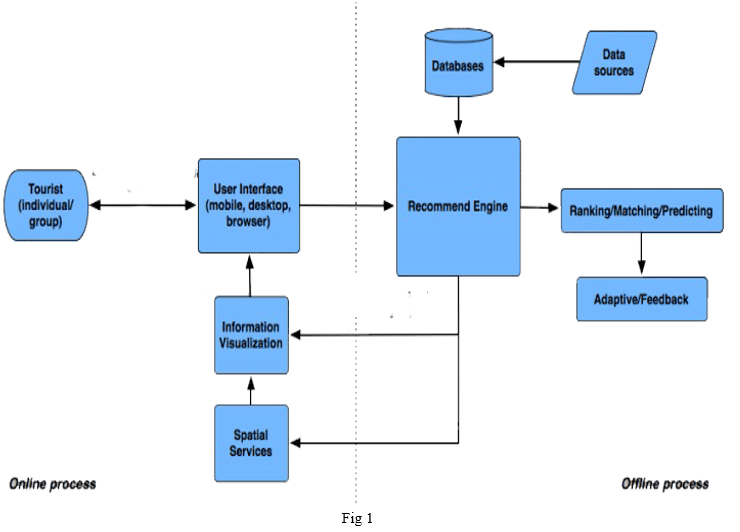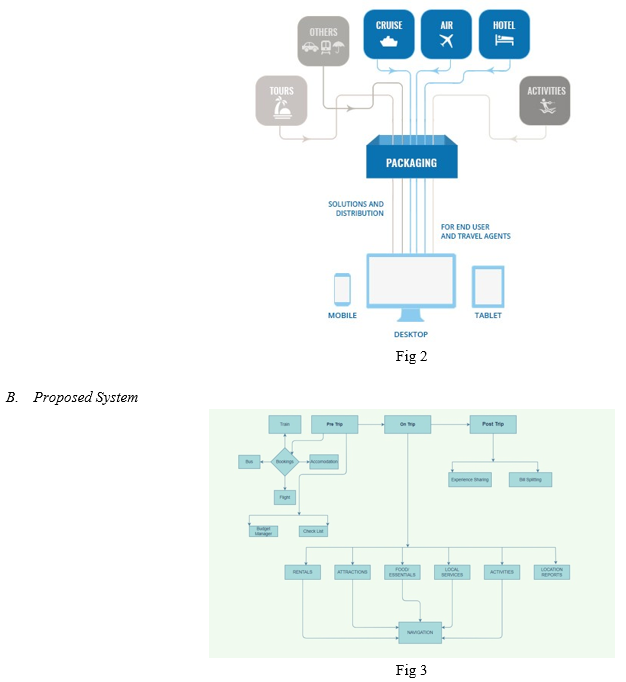Ijraset Journal For Research in Applied Science and Engineering Technology
- Home / Ijraset
- On This Page
- Abstract
- Introduction
- Conclusion
- References
- Copyright
The Fellow Traveller: A Machine Learning Approach to Travel Management
Authors: Yogesh Kumar
DOI Link: https://doi.org/10.22214/ijraset.2022.41613
Certificate: View Certificate
Abstract
Even after the presence of multiple services which helps us in travelling like Uber, Ola, Make My Trip, Goibibo etc, the travelling enthusiasts or peoples who are going on vacation don’t have proper platform where they can plan their entire trip at one place. There are so many places where only local rental services is available means no online cab services, no platform to contact a guide, platform to book self-driving vehicles, to check the current and predicted weather conditions of the destination, proper expense splitter if travelling in group and a platform which can predict the proper ways through which you can travel to the destination in a set budget. These problems demands an application which helps to manage all the travelling requirements like rental vehicles, hotels, activities, budget manager, expense splitter if travelling in group etc. Also to provide direct contacts of local drivers, help centres, emergencies etc. An application which can use machine learnings prediction system like Support Vector Regression Model and Adaptive Neuro Fuzzy Inference Systems, Expectation Maximization and Self-Organizing Map for clustering techniques and for dimensionality reduction, Principal Component Analysis.It will be really helpful to all the travel enthusiasts as well as this platform can also provide broader scope to the local vendors and peoples of the entered destination as it will directly connect the travellers to them, and it can recommend best services to ease the travel. It will also provide air pollution report and alternative tour plan.
Introduction
I. INTRODUCTION
It seems very easy, but an organized travel is still a very challenging job one has to perform for hassle-free travels. A traveler has to go through n number of websites and applications to organize his full travel like bookings, rentals, location condition and budget management. It is also very challenging to plan the travel cost-effective and resource efficient. A traveler requires an application which can behave like a travel companion in travelling as it can help to plan the entire travel from start to end.The basic services likerecommending best hotels, buses, flights and trains in a set budget for travelling as well as status of air pollution, weather, covid cases and any natural disaster based on which it can provide alternate tour plan. Also, direct connection to local vendors and emergency services. Other services also include rentals, expense splitter and budget management. This paper presents the comprehensive investigation of the available solutions to the multiple problems for a proper travel management and it also suggests the further integrations which can be done to improve the traveler requirements fulfillment and easy navigation to experience a full fledged adaptive pre trip, on trip and post trip plan.
II. RELATED WORK
There are several related works available which has been already published. In this section we will analyze the related surveys approaches for the problems and there solutions and extend it to make more useful for a traveller. Below are some literature reviews:
- Related survey paper (Afsahhosseini, 2020)[1] describes that Machine Learning in the travel industry, predominantly utilizes information including Statistics, Photos, Maps, and Texts, and is likewise utilized in three phases Pre, During, and After trip and gives the essential translations utilizing Models, Approaches, Algorithms, Processes, Trends, Systems, etc. As per the understandings acquired, the vital choices can be utilized to further develop the travel industry to assist decision makers who with working in the travel industry. For example, utilizing Tourism Demand Forecasting pre outing to acquire data on the appearance of travelers later on, utilizing Tourism Recommendation Systems during outing to propose more designated trips, decrease traffic and air contamination, and come by the most ideal outcomes in the best time proposed to sightseers, and utilizing the Sentiment Analysis after excursion to acquire travelers perspectives on vacation destinations, and data about Tourism Infrastructure, for example, stopping, shops, sterilization administrations, trail pointers, thus on is valuable, which can assist Tourism Managers and Planners with further developing them for acquiring the fulfillment of vacationers, and along these lines drawing in more travelers in more serious locations in future.
- (Omrani, 2015)[2] has pointed out the utilization of four machine learning strategies to be specific neural net-RBF, neural net-MLP, multinomial logistic regression, and support vector machines for movement mode decision prediction of the travellers. The aftereffects of the survey support the artificial neural network models for trabel mode decision forecast on account of its promising exhibition. By applying cross-approval strategy, the productivity standard APCA (normal likelihood of right evaluation) of SVM and MNL is as yet higher, but ANN had somewhat better execution which expands the exactness of the expectation. In the application, an enormous arrangement of factors connected with transport cost, work and home spots, social and segment factors like orientation and ethnicity have been utilized with a genuine dataset to display the portability of travelers.
- Agni Dika(Dika, 2011)[3] has presented a similar survey, which makes a correlation for a portion of the existing travel planning approaches. This review pointed the absence of support for scenic routes, hotel selection, public transportation and gathering profiles. In addition, it is presumed that arrangement of automatized point of interest choice and steering is a forthcoming pattern in traveler recommender applications. The need to propose tweaked touristic visit arranging with acceptable reaction time is featured. According to the survey paper, The City Tripp Planner is singled out as the most one of a kind incorporated framework for electronic vacationer choice help.
- Comparable study(Zhang, 2016)[4] has investigated the remarkable attributes among group travelers like unique individual requirements, relational aspects, cohesiveness, appropriation of roles, and level of consistency within the groups. Be that as it may, these examinations are predominantly hypothetical, also absence of observational review to illuminate planners how to support group travelers with the help of innovation. It investigated about the contrasts in various sorts of traveler groups and assesses plan feasibility as far as technical acknowledgment and effects on traveler experience.
- Similar paper (Huang, 2011)[5] pointed out that there are a few weaknesses in the customary manner, where local guides count the group, and afterward checks assuming the number counts with the number on the rundown of guests got from the travel planners, while showing up at the places of interest. Such manual bring throughout is tedious and is some of the time wasteful while managing an enormous number of vacationers. Another inconvenience is the control of vacationer’s development all through the travelers' hotel as a considerable lot of this retreat is expected to be near non-guests. This presents genuine trouble to the local escorts and screens as they need to issue authorization to individuals in the gathering each time they need to leave the setting. This truly affects the proficiency of the travel industry the executives because of expanded responsibility. It then proposes a group travel management and customized guide based on Radio Frequency Identification. Given the contrast between the roaring travel industry and the present guide service, joined with the benefits of the non-contact radio frequency identification, this program has a decent monetary and social value for working on the proficiency of the management and quality of the travel industry.
- A closely related survey paper (Thomas, 2019)[6] pointed that suggesting a stay for vacations or a work trip can be a provoking task because of the huge number of options and considerations available to the traveler. In this review, a proposal motor is intended to distinguish important stays in view of elements of the facilities and the setting of the trip by means of flight data. The cascade machine learning framework was planned as a fell artificial intelligence pipeline, with a model to foresee the transformation likelihood of every hotels and one more to anticipate the change of a set of hotels as introduced to the traveler. By breaking down the component significance of the model in view of sets of hotels, they have develop ideal arrangements of hotels by choosing individual stays that will augment the likelihood of change.
- Another technique (Yuanzhe Geng, 2020)[7] stated that route Planning is significant in transportation. Existing works center around tracking down the briefest way arrangement or utilizing measurements, for example, security and energy utilization to decide the preparation. It is noticed that the vast majority of these examinations depend on earlier information on street organization, which might be not accessible in specific circumstances. In this paper, it was suggested to plan a course arranging calculation in view of profound support learning (DRL) for walkers. Using travel time utilization as the measurement, and plan the route by foreseeing passerby stream in the street organization. The methodology accepts that the specialist needn't bother with any earlier data about street organization, however just depends on the cooperation with the climate. It proposes a powerfully flexible course arranging (DARP) calculation, where the specialist learns systems through a dueling profound Q organization to keep away from blocked streets.
- (Hao, 2021)[8] a so closely related work presented that the common recommendation system can be utilized as a method of data separating, and it is a compelling means to manage the peculiarity of data overload. The framework depends on the undertaking model and client model, and its motivation is to observe the task required by the objective client. As of now, setting mindful help is a critical component in internet based travel planning framework. The most broadly utilized emotion analysis techniques are machine learning and dictionary. Sentimental Analysis through word references is to decide the opinion inclination of the text as per the joining of text vocabulary. As indicated by various wellsprings of sentimental word references, it is isolated into dynamic word reference investigation strategy and existing word reference examination technique. Through machine learning, sentimental analysis techniques are partitioned into naive Bayes, neural network, support vector machine, and other sentimental analysis strategies based on text.
III. METHODOLOGY
This study has a descriptive research characteristic because learning technology is a new area in social studies, especially in tourism. Descriptive study has an inductive nature and such as a typology, researcher attempts to find out the relationships and pattern which have helped to understand the concept before producing the data. Researchers offer different descriptive research strategies based on new data generated or existing data. According to literature, there is a rare exact developed scale or measurement tool for learning technology. However, it has not been encountered with a specific methodological approach because of the conceptual nature of the learning technology. This study will first try to capture and evaluate the conceptual and theoretical basics. Despite receiving a few sources, some secondhand data (related literature, some statistical indicators) and researchers’ experiences or observations can provide sufficient infrastructure for this study. Therefore, this study methodology is constructed as descriptive based on theoretical approaches without using quantitative and qualitative analysis.

IV. ANALYSIS AND INTERPRETATION
This paper analyses that there are multiple applications and websites available to book a tour based on location and searching multiple offers and analysis just to select one of the travel packages, deciding on selecting travel mode, routes, checking the location environment and searching for attractions and locations to go to etc. All these troubles requires an Artificial Intelligence and Machine Learning models to help in an individuals and groups tour management along with providing functionalities of knowing the location a traveler is going to and assistant in all the requirements and need fulfillment during travelling.
A. System Design
The application is designed in such a way that all the requirements of an individual or groups to travel is available at the same place. The TFT provides all the travel needs through its recommendation engine and it provides a Chabot to suggest the best travel modes and routes to a destination along with providing all the travel related information.

The TFT has included multiple features and functionalities from all the basic to advance requirements for travelling based on Pre trip, on trip and post trip model suggesting the best bookings of multiple travelling modes as well as the accommodation. It provides users direct interactions to the local service providers along with providing weather, air and disease reports at the destination location. The TFT have basic services like checklists, bill splitter, experience sharing and recommender system.
C. Experimental Results
The application has provided multiple outputs based on the set budget to select the travel modes and accommodation along with the weather, air and disease reports. The TFT application has also recommended the local service providers for the rentals and shopping’s so that the traveler can experience the actual environment and culture of the destination and be always availed with the required services during their trips and the attractions to visit.
Conclusion
Despite the wide range of travel software products available in the market, chances are that none of them will exactly fit everyone’s current needs, as all businesses and situations are unique. Data driven technology helps both the consumers and the brands to make the best possible use of their resources be it money, time or manpower without cutting out on benefits from both the sides. Machine learning is clearly one of the most promising technology fields that are changing the way we travel. With the continuous development of the tourism industry, integrating the Machine learning into tourism projects is a very promising technology. Smart tourism uses the ML to maximize information analysis and information integration, as well as to achieve a fast and convenient information exchange between users. In other words, the Machine Learning will become an important element to meet the needs of the new generation of tourists. Based on this, we propose a travel management system using machine learning’s algorithms like KNN classification, Support Vector Regression Model and Adaptive Neuro Fuzzy Inference Systems, Expectation Maximization and Self-Organizing Map for clustering techniques and for dimensionality reduction, Principal Component Analysis. The machine learning can effectively help tourists make a decision on whether to choose a certain travel destination based on historical order data and historical browsing information. The results obtained from the experiments prove the effective and efficient travel management using machine learning. Tourism needs to focus on ML technology to develop a better service system for tourists and to support the travelers through technological advancement in the organization. This research contributes to the tourism and technology literature by shedding light on the use of ML in tourism advancement to predict future business conditions, revenue, challenges and also to identify the current trend of tourist demand. Moreover, it helps to improve traveling ML approaches and indicate the impacts in addition to the above mentioned what best applies to management in the travel industry.
References
[1] Fatemehalsadat Afsahhosseini, Yaseen Al-Mulla (2020). Machine Learning in Tourism. Conference Paper, MLMI ’20, September 18–20, Hangzhou. [2] Hichem Omrani. Predicting travel mode of individuals by machine learning. 18th Euro Working Group on Transportation, EWGT 2015, 14-16 July 2015, Delft. [3] Kadri Sylejmani, Agni Dika. A SURVEY ON TOURIST TRIP PLANNING SYSTEMS. International Journal of Arts & Sciences, 4(09):13–26 (2011). [4] Lanyun Zhang, Xu Sun. Designing a Trip Planner Application for Groups: Exploring Group Tourists’ Trip Planning Requirements. Late-Breaking Work: Collaborative Technologies. CHI 2016, San Jose. [5] Wentao Huang, Bangxiang Zhu. Management of Tourism Group and Technology of the Personalized Tour Based On RFID. 2011 Chinese Control and Decision Conference (CCDC). [6] Eoin Thomas, Antonio Gonzalez Ferrer. Cascaded Machine Learning Model for Efficient Hotel Recommendations from Air Travel Bookings. RecTour 2019, Copenhagen. [7] Yuanzhe Geng, Erwu Liu, Rui Wang and Yiming Liu. Deep Reinforcement Learning Based Dynamic Route Planning for Minimizing Travel Time. arXiv:2011.01771v1 [cs.LG]. [8] Yange Hao and Na Song. Key Technologies and Discrete Dynamic Modeling Analysis of Online Travel Planning System Based on Big Data Scenario Aware Service. Hindawi. Discrete Dynamics in Nature and Society Volume 2021.
Copyright
Copyright © 2022 Yogesh Kumar. This is an open access article distributed under the Creative Commons Attribution License, which permits unrestricted use, distribution, and reproduction in any medium, provided the original work is properly cited.

Download Paper
Paper Id : IJRASET41613
Publish Date : 2022-04-19
ISSN : 2321-9653
Publisher Name : IJRASET
DOI Link : Click Here
 Submit Paper Online
Submit Paper Online

